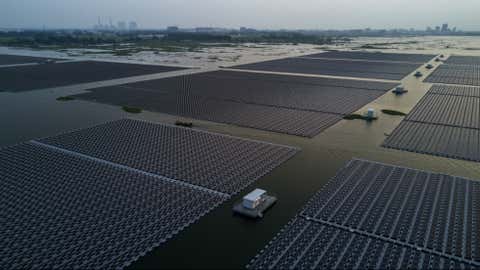
At a Glance
- A new study says solar power could be used to convert carbon dioxide to methanol.
- The process would be done on large man-made islands floating in the ocean.
- The system faces many challenges.
Could giant floating islands that use solar power to convert atmospheric carbon dioxide to engine fuel be the planet's answer to eliminating greenhouse gas emissions?
A recent study says yes, but other experts say the idea is far from reality.
"Humankind must cease CO2 emissions from fossil fuel burning if dangerous climate change is to be avoided," researchers wrote in the study, published this month in the journal PNAS.
"The recycling of atmospheric CO2 into synthetic fuels, using renewable energy, offers an energy concept with no net CO2 emission. We propose to implement, on a large scale, marine-based artificial islands, on which solar or wind energy powers the production of hydrogen and the extraction of CO2 from seawater and where these gases are catalytically reacted to yield liquid methanol fuel."
(MORE: More Extreme Weather in Africa's Future, Study Says)
Methanol is an alternative fuel that can be used on its own or mixed with gasoline in automobile engines.
The use of floating solar panels to create electricity is becoming more common. One such project built near the city of Huainan, China, in 2017, can power up to 15,000 homes, according to Smithsonian.com.
The new research proposes taking that concept several steps further and building giant islands, on the ocean but in areas with typically calm seas, that would act as production facilities using solar energy to power extraction of carbon dioxide from ocean water and convert it to methanol.
"[The] biggest challenge is the development of a large-scale device to extract CO2 from seawater," Andreas Borgschulte, a Swiss scientist who worked on the study, told Newsweek. "This process is the only one of the total system [that] has not yet been fully developed. All others exist already on an industrial scale."
Scientists not involved in the study said that, while the research is sound, there are some major hurdles to overcome before such a concept can become reality.
"I think the challenges extend way beyond what they see, not least the question of how the materials – solar panels – will survive in the ocean environment (chemical and physical), and how the petrochemical plant would really work at the desired scale with the type of maintenance required on an offshore platform," Peter Edwards, a professor of inorganic chemistry at the University of Oxford, told Newsweek.
Another Oxford professor, Henry Snaith, also expressed skepticism.
"I don't think the idea is totally bonkers, but I also don't think it's the world-saving concept it's bid to be," Snaith told Forbes.com.
"The other components needed for the idea are extracting CO2 from sea water and then turning this into fuel. This part would be very energy-intensive and costly. Work on creating fuels from electricity – as opposed to directly from sunlight – are massively important. This will ultimately enable solar and wind to produce 100% of our power needs and should be encouraged."
Borgschulte and his fellow researchers acknowledge the challenges, and say their study is just the first step.
"The present work initiates the development of this concept and highlights relevant questions in physics, chemistry and mechanics," they wrote.



